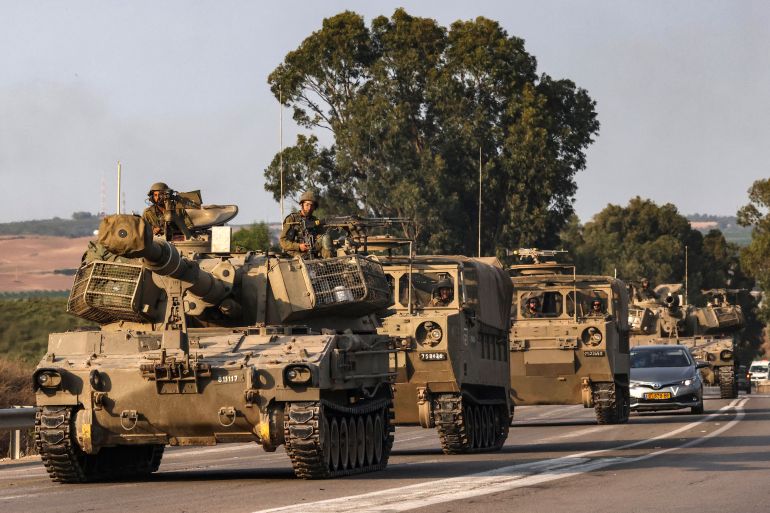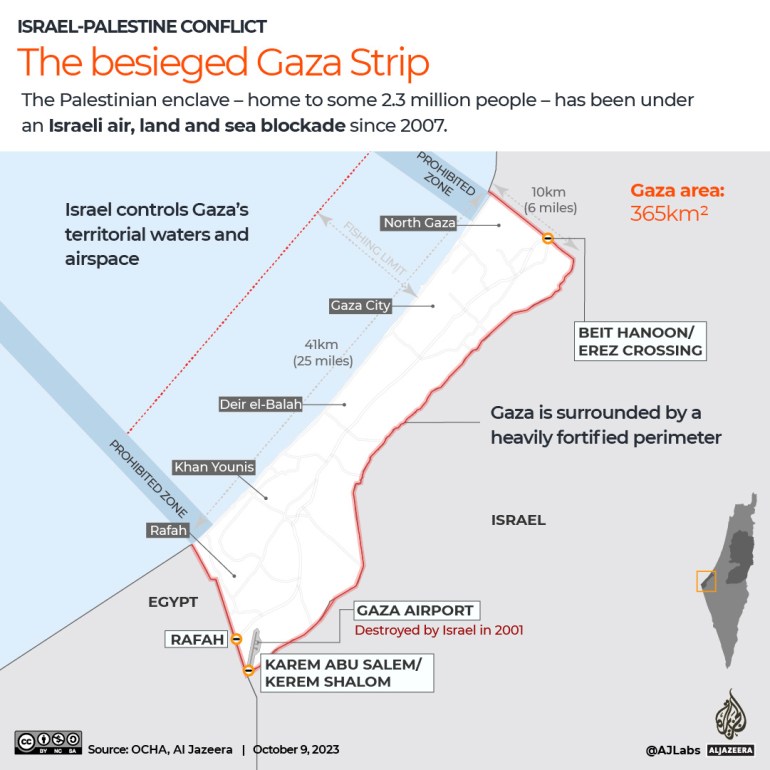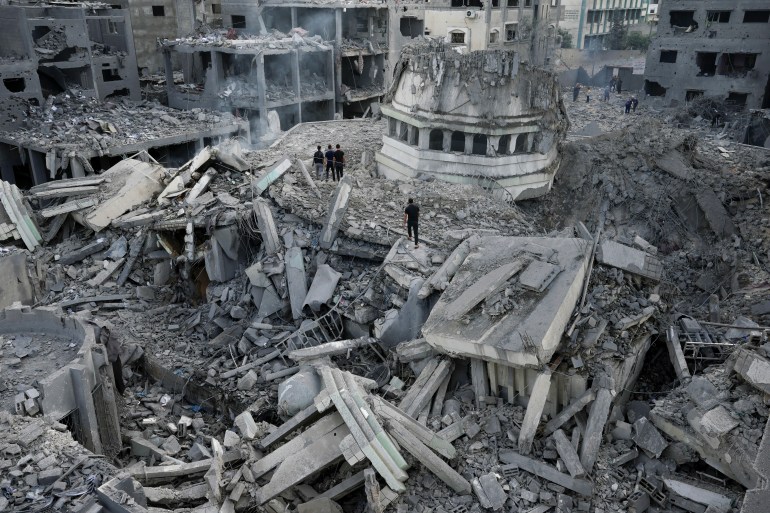What does Israel’s declaration of war mean for Palestinians in Gaza?
Israeli PM says his country is at a war after deadly Hamas attacks, greenlighting a possible ground invasion of Gaza.

Israeli Prime Minister Benjamin Netanyahu on Sunday declared that his country was “at a war” after Hamas, the Palestinian group that governs Gaza, sent dozens of its fighters into Israel in one of the deadliest attacks in decades.
“We are at war. Not an ‘operation,’ not a ‘round,’ but at war,” Netanyahu said, adding that “the enemy will pay an unprecedented price”.
Keep reading
list of 4 itemsPhotos: Israel declares state of war, attacks on Gaza intensify
‘Where do we go?’: Gaza residents as Israel declares war, bombs homes
Israel announces ‘total’ blockade on Gaza
More than 700 Israelis, including dozens of soldiers, have been killed after Hamas fighters went on a rampage inside Israeli territory, taking many of them captive. Israel soon launched air strikes on Gaza killing more than 400 Palestinians.
Netanyahu has ordered mobilisation of more than 100,000 Israeli forces as it prepares for possible ground invasion of Gaza, which has remained under an Israeli air, land and sea blockade since 2007.
Since Israeli troops and settlers withdrew from Gaza in 2005, the besieged territory – home to two million people – has faced several rounds of deadly Israeli assaults. More than 2,000 Palestinians were killed in Israeli assaults in 2014. At least 73 Israelis, including 67 soldiers killed in the seven-week war.

What does the war declaration mean?
Israel has launched military offensives in Gaza and Lebanon before, without a formal declaration. The declaration now essentially greenlights Israel’s intensified military action against Hamas.
Mohammed Jamjoom, Al Jazeera’s correspondent in West Jerusalem, said the Israeli cabinet’s approval of Netanyahu’s declaration of war means: “The prime minister and the defence minister can essentially make decisions going forward without having to consult the cabinet when it comes to every specific action.”
“It essentially formalises it, legalises the war going forward,” he said.
Meanwhile, Francesca Albanese, the United Nations special rapporteur on the occupied Palestinian territories, has warned of a “dangerous” narrative about the Israel-Hamas conflict that ignores the history of violence against Palestinians.
Could a ground offensive follow?
In his war declaration, Netanyahu told Israelis: “We will bring the fight to them with a might and scale that the enemy has not yet known,” with observers suggesting a land invasion by Israel could be imminent.
On Monday, Israel said a “total blockade”, including a ban on admitting food and fuel, would be imposed on the Palestinian enclave raising concerns about the well-being of its residents who have been facing incessant bombardments in the past two days.
More than 120,000 people in the besieged Palestinian enclave have been displaced due to the intense bombardment.
Al Jazeera’s senior political analyst, Marwan Bishara, warned that the situation between Israel and the Palestinians “is going to get much worse” in the coming days, with the possibility of an Israeli ground operation coming to a head.
Saleh al-Arouri, a Hamas leader, told Al Jazeera, they were ready for “the worst-case scenario”.
“We will continue to fight until we are rewarded with victory, freedom and independence,” he said.
“This is not a [hit-and-run] operation; we started an all-out battle. We expect fighting to continue and the fighting front to expand. We have one prime target: our freedom and the freedom of our holy sites,” he told Al Jazeera.
Al-Arouri said Palestinians have a right to freedom, to fight the Israeli occupation and to safeguard their holy sites.
Hamas does not recognise Israel and has been calling for Israel to end the 16-year blockade of Gaza. It wants the future Palestinian state on the basis of the 1967 borders. Israel captured large swathes of Palestinian territories in that war.
How have other nations responded to the war?
The rest of the world does not need to recognise or respond to a declaration of war in order for war to happen. Western nations led by the US have stood in solidarity with Israel while being mute on the decades of Palestinian suffering under occupation.
The US rushed to support its ally by ordering its naval vessels the Ford carrier strike group, laden with warplanes, to sail to the Eastern Mediterranean.
Regional countries have called for “an immediate halt to military operations in Gaza” and “the cycle of armed confrontation between the two sides” while China has urged both sides for “calm”.

The United Nations Security Council (UNSC) on Sunday met behind closed doors in an emergency session amid the war between Israel and Hamas but failed to achieve the unanimity needed for a joint statement. A statement needs to be agreed upon by consensus.
Diplomats said members led by Russia were hoping for a broader focus than condemning Hamas.
Russia’s ambassador to the UN, Vasily Nebenzya, told The Associated Press that long-stalled negotiations between the two sides need to resume, whilst China’s ambassador, Zhang Jun, said it was important to come back to a two-state solution, where Israel and Palestine live side by side.
Saudi Arabia, a country that has been taking steps to normalise relations with Israel, also called for a peaceful two-state solution with an immediate cessation of the fighting.
Are all wars always officially declared?
No, since World War II, there have been very few declarations of war.
Previous assaults on Gaza and neighbouring Lebanon by Israeli forces have not been preceded by a declaration of war as is the case this time.
Russian President Vladimir Putin has never declared a state of war with Ukraine, but instead referred to the 2022 invasion, that continues today, as a special military operation.
The US didn’t declare going to war in Vietnam, justifying it as helping one side in an already existing civil war. The UK also did not declare the Falklands War (against Argentina) as it was seen as an act of self-defence which is a legal right under the UN convention.